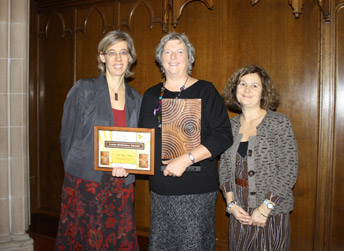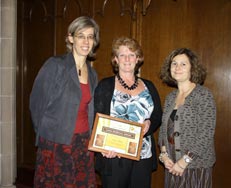2009 winner
Winner: St Francis Hospice
Highly commended: Lorraine Youdle
Runner-up: Advanced Decision Making Tool Working Party
We were delighted and encouraged to receive a range of nominations for the award, of a very high standard. It is clear that many individuals, teams and organisations across the UK are working hard to provide excellent care and support for people with learning disabilities at the end of life, and to improve their practice.

Award winners 2009, with the chair and vice chair
Winner 2009: Saint Francis Hospice in Romford, Essex.
Saint Francis Hospice had initiated a project to improve care for people with learning disabilities who have advanced life-limiting illness. The judges were impressed with the hospice’s sustained commitment to meeting the needs of people with learning disabilities, leading to changes in practice and excellent collaboration with local learning disability services.
New initiatives included changes in the hospice referral form to alert staff to the presence of learning disabilities; fast-tracking patients with learning disabilities; making resource packs and communication tools available to staff; staff training; identifying among hospice staff ‘champions’ for adults with learning disabilities; and on-going regular meetings and collaboration with those supporting people with learning disabilities at home and in hospital.
These changes have led to tangible improvements in the support of people with learning disabilities at the end of life. The judges felt that Saint Francis Hospice has set a bench-mark for palliative care services everywhere.
In her acceptance speech, palliative care nurse specialist Janet Kirby explained how the hospice had worked towards this:
“In November 2006, Jane Sutherland (Director of Patient Services) and Corinna Midgley (Medical Director) attended a conference at Help the Hospices on widening access for marginalised groups to palliative care.
On return from the conference, they recognised their shortfalls in knowledge and confidence but had a passion to bring best care to those who need it. They invited local experts working within learning disabilities services in the community and colleagues within the Hospice to join a process mapping exercise at the Hospice, using the Help the Hospice Widening Access model.
The process mapping exercise identified a huge gap in understanding of support services and supportive material for people with learning disability and a huge gap in understanding of specialist palliative care services available for support through difficult times.
Several key action points emerged from the mapping, along with a real commitment to work together – a working group was formed.
The commitment by everyone in the group to work together on this project was exciting and inspiring – it has resulted in some excellent developments.
- A change to the hospice referral form to ensure that people with vulnerabilities such as learning disability are highlighted.
- A greater knowledge and understanding by learning disability staff of hospice services, and better knowledge of when a referral would be appropriate.
- A greater understanding of the challenges people with learning disability have, and how to best support them.
- The creation of resource packs to support the hospice team, of common conditions and communication tools.
- The development and implementation of a Fast Track Pathway towards early face to face contact with the client and their key worker.
To mark this joint working initiative and to publicise our work together, the hospice held an excellent one day Conference – ‘Learning Disability; Ensuring Excellence and Empowerment in End of Life Care’…
The initial enthusiasm has not diminished…
- We presented posters at the European Association of Palliative Care Congress in Vienna (May 2009) and at the Help the Hospice Conference in Harrogate (November 2009)
- An audit of 8 patients referred to St Francis Hospice with learning disability in the last 16 months has just been completed. This reveals real benefit from the changes made, with recognition that there are areas for improvement and future development.
We would particularly like to acknowledge the work and support that Jane Whittington (Community Learning Disability Nurse) and Peng Ma (Learning Disability Health Care Co-ordinator) have given to the project and thank them for nominating St Francis Hospice for this Linda McEnhill Award.”
Highly commended 2009: Lorraine Youdle
Lorraine is a learning disability nurse in Devon. She showed how one person’s drive, commitment and determination can inspire everyone to provide better care.
When Lorraine moved into a community based service, her team encountered a high number of people with learning disabilities who had life limiting conditions, dementia, and palliative care needs. In addition, they found that carers and families were struggling with relatively new issues of an ageing population.
The community team began meeting regularly to address someone’s changing care needs, involving a range of people involved in that particular person’s care. As their understanding grew, Lorraine led a special interested group which developed an End of Life Checklist Tool, to try and ensure a high quality care for people with learning disabilities. This is now being used and piloted by learning disability nurses throughout Devon.

Runner-up 2009: Advance Decision Making Tool Working Party
Close runner-up was the Advance Decision Making Tool Party in Kent, a collaboration between EllenorLions Hospice Team, Oxleas NHS Trust CLDT and Mcch Society Ltd. This joint piece of work was to address the need for considering end of life care issues for adults with learning disabilities who lacked capacity. The group devised a Forward Planning Tool for health care decisions. It incorporates relevant aspects of the Mental Capacity Act 2005, and evidence of best interest consideration.
The tool has already had a positive impact on the care of several people with learning disabilities who were dying. The judges were impressed with this work, and felt that it could benefit people not only in Kent, but had relevance for people with learning disabilities across the UK.
